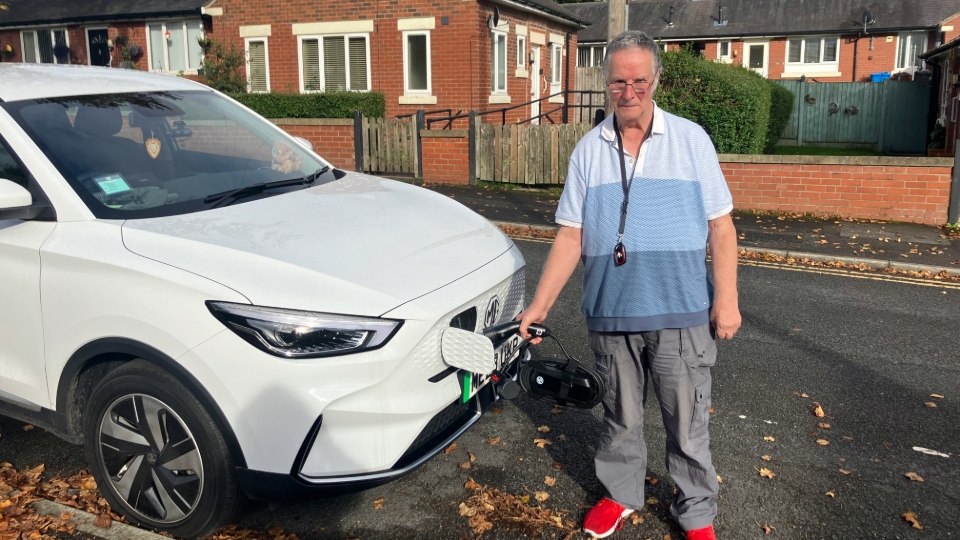‘It’s driving me crazy’: Pensioner ‘blocked’ from charging his car at home despite government bodies urging public to switch to electric
Reporter: Charlotte Hall, Local Democracy Reporter
Date published: 28 October 2024

David Kelsall is pictured next to his EV. Image courtesy of Charlotte Hall
A resident of Oldham claims he is being ‘blocked’ by the council from charging his electric car (EV) at home.
David Kelsall has been pleading with the council for six months to let him charge his car on the street outside his home.
The retired car mechanic claims he feels ‘unsafe’ using his nearest public charger, a three mile drive away from his home in Hathershaw, due to his heart condition and antisocial behaviour in the area.
But despite the governments’ push for a transition to EVs, the local authority claims it ‘can’t approve’ the request because they are ‘still waiting for guidance’ about on-street charging.
Kelsall said: “It’s driving me crazy. It’s making me unwell.
“They’re doing everything to try and obstruct me.
"And I’m doing everything to work with them and find a solution.”
He went on: “I’m totally dependent on my pacemaker.
"A watch battery is keeping me alive.
"People like me and others with health conditions and disabilities should not have to use a public charger. It’s unsafe. “
Along with more than half of the population in the North, Kelsall has no access to off-street parking.
Transport for the North (TfN) recently identified the region’s relative lack of driveways (53 percent compared to 40 pc nationwide) as one of several major obstacles to EV ownership.
Yet fearful he would get ‘caught out’ by the government’s ‘phase out’ approach to ban the sale of petrol vehicles by 2035 (initially by 2030), and concerned about the level of air pollution in Greater Manchester, Kelsall invested in an EV anyway.
But with his health complications and the significantly higher cost of public charging points, led him to appeal to the council to let him install on-street parking.
In emails seen by the LDRS, officers cite ‘trip hazards’ as the grounds for refusal, despite the design being set into the pavement to prevent any safety concerns.
The council told the LDRS they aren’t ‘in a position to approve any cross-pavement channels for electric vehicle cables at this time’ due to a lack of government guidance.
Councillor Chris Goodwin, whose portfolio covers highways, said: “We are still waiting for guidance to be published and in the meantime are working with Transport for Greater Manchester to develop a regional approach.
“Similar areas to Oldham that have trialled cross pavement channels have reported that they can become trip hazards, something which could be dangerous, especially for people with limited vision or mobility issues.
"The trials also found that they are not suitable in areas of high parking demand, so we’ll need to carefully consider which areas we would allow them to be installed in.
“The safety of pedestrians and road users is a priority for the council so until we receive guidance on the way forward we will not be considering any applications.”
Yet advice on a government website suggests residents can install on-street chargers, so long as they can ‘safely charge when parked on the street’ and ‘have planning permission’ so long as cables that cross footways are ‘inside a proper cable protector’.
Local authorities like Milton Keynes and Bolton are piloting their own on-street parking schemes with designs that are fitted in ridges across the pavement using government funding.
And the government messaging is slanted towards an EV transition, with TfN, an off-shoot of the Department for Transport, argueing in a soon-to-be-published report that it was ‘critical that the transition to electric vehicles takes place’ and pushing for greater investment in regional infrastructure.
“They’re just being awkward about it,” Kelsall said.
“Other councils around the UK are adopting this and they think it’s brilliant.”
The pensioner noted that a lot more public chargers have recently been installed around Oldham, but said ‘they’re not affordable’.
He said: “They’re 80p a kw against 7p a kw [at home].
"That’s a big difference, especially for someone on their pension.
"It makes it dearer to run an electric car than a petrol one.
“I love the car. But it would eventually force me to go back to petrol.”
Industry experts expect the government to introduce plans to invest more in EV infrastructure and company car tax at the upcoming budget on October 30.
Do you have a story for us? Want to tell us about something going on in and around Oldham? Let us know by emailing news@oldham-chronicle.co.uk , calling our Oldham-based newsroom on 0161 633 2121 , tweeting us @oldhamchronicle or messaging us through our Facebook page. All contact will be treated in confidence.
Most Viewed News Stories
- 1Driver flees after crashing and colliding with two parked cars in Oldham
- 2The streets where it’s too expensive to work
- 3One of the last drinking spots in Mossley to be turned into flats
- 4Oldham police seize £250k worth of stolen vehicle parts after identifying them for sale on buy/sell...
- 5Here's the full list of Bee Network bus and Metrolink tram tickets after bosses announce fare...




